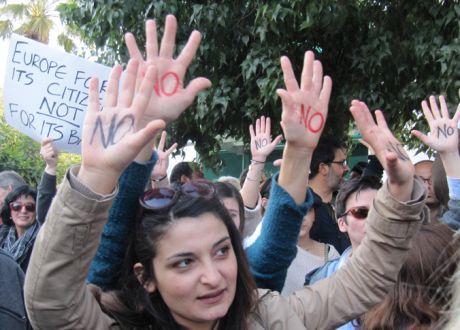News
You are here
Cyprus: outrage against austerity

March 25, 2013
The world turned its attention to the tiny island of Cyprus this week as it became the latest domino to fall in the ongoing global economic crisis. In the early hours of March 16, the right-wing Democratic Rally (DISY) government of Nicos Anastasiades reached an agreement with the EU and the IMF on the terms of a $13 billion bailout that has sparked outrage on and off the island.
Rightfully referred to by many as a bank heist, the agreement signaled a qualitative shift in the EU austerity agenda, as it included a controversial proposal to steal money directly out of Cypriot savings accounts in the form of a "deposit levy".
The bailout plan went through a few different iterations before it was eventually voted down (36 against, 19 abstained) in parliament.
The first plan consisted of Cypriot bank depositors with less than $130,000 to see their accounts reduced by 6.7 per cent, and accounts with more than $130,000 reduced by 9.9 per cent. The plan also included a mere 2.5 per cent increase to corporate taxes, raising the corporate tax rate up to 12.5 per cent.
Until last week, Cyprus was the perfect tax haven with the lowest corporate tax rates in Europe, attracting billions in investments from primarily Russian oligarchs. This puts lie to the claim being made by Anastasiades and the Cyprus Central Bank that there is no other choice but to reach into the pockets of the working class.
The reaction to the proposal by Cypriot citizens was swift: people began lining up at ATM machines to try to withdraw as much money as they could before any reduction could be made. One man parked a bulldozer outside of his local bank branch to express his anger, while some 1,000 protestors gathered outside parliament to throw sheep’s dung and wool at the entrance symbolizing the “haircut” imposed on them.
The proposal that was eventually voted on managed to exclude accounts with under $26,000, but still consisted of accounts with $26,000 - $136,000 reduced by 6.7 per cent, and accounts with over $136,000 reduced by 9.9 per cent. As I write this, Anastasiades and his pro-austerity allies in the Troika are currently hammering out the details of a "Plan B," of which MPs have thus far approved the nationalization of public and private sector pensions and capital controls to prevent capital flight when the banks re-open.
In the midst of all the confusion, two things have become clear. First, some sections of the EU ruling class appear to be interested in using Cyprus as a testing ground for more drastic austerity measures. Until now, the EU bailout packages have been forcing the working class to line the pockets of bankers through indirect means: regressive taxation and cuts to jobs, social services, and pensions. However, by breaking the taboo against touching private savings, they have attempted to set a precedent for a more direct redistribution of wealth from the poor to the rich across the eurozone.
Second, it is important to recognize the amount of disagreement that has erupted between the leaders of EU member states, bankers, and right-wing pundits over the strategic viability of the Cypriot bailout. This signals a crisis of hegemony within the European ruling class, and provides an important opening for the revolutionary left. While the logic of austerity continues to be the guiding principle, the way forward has never been less clear for the EU ruling class, and the working class are rising in ever greater numbers to reject the demands of the Troika.
Section:
Topics:










